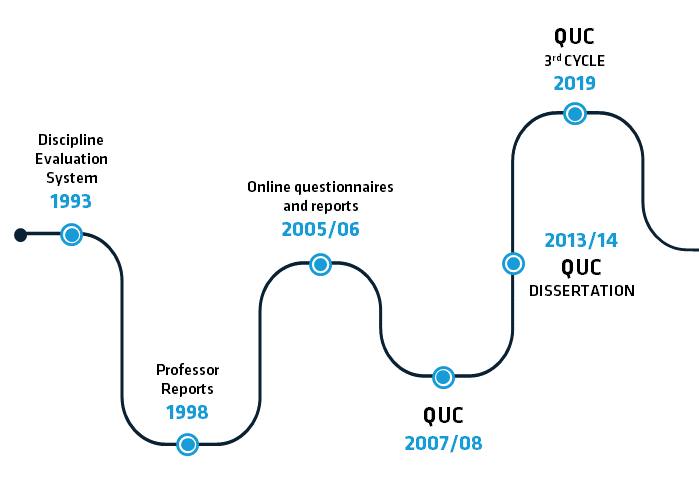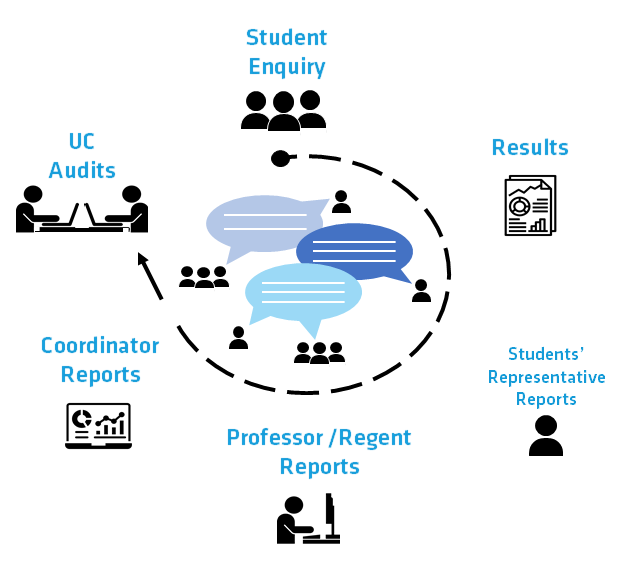Note
The documents available for download/ consultation in this webpage are in Portuguese – we are currently making an effort to produce these in English.
This page presents the Quality Assurance System for IST’s Curricular Units (QUC), under the following topics:
Historical Overview
Regulated since 1998 by the Pedagogical Council, but in operation since 1993, the system for evaluating the performance of the disciplines responded to various requests, both internal and external, regarding the need to evaluate and monitor academic activities.
In 2007, with the need to adapt to the Bologna process and the international reality, a review and evaluation of the teaching and learning process itself was carried out, culminating in the launch of an internal quality assurance system – SIQuIST (IST’s Integrated Quality System).
Within this framework, the guidelines for the construction of a new Quality Assurance (Sub) System for IST’s Curricular Units (QUC) were defined, which provides for a biannual assessment of each of the Curricular Units (UC) of IST’s courses, with the following central objectives:
- monitoring the functioning of each UC in relation to its objectives, as established in the curricular plan of the course;
- promoting the continuous improvement of the teaching, learning and assessment process and student involvement in it.
Later, in 2013, the Pedagogical Council highlighted the importance of creating a survey for the Dissertation UC, and the QUC was extended to the 2nd cycle. This survey, in its current version, aims to focus on evaluating the process of selecting and registering the dissertation topic proposal, the process of developing the dissertation itself, and the final stage involving discussion and classification of the dissertation.
More recently, in 2019, the Pedagogical Council, together with the Scientific Council, emphasized the importance of extending the evaluation system to 3rd Cycle (PhD) courses. This survey aims, then, to collect information on the experience and expectations of students during their PhD program.
We suggest consulting the QUC Dissertation and QUC 3rd Cycle webpages for more information on each of these processes.

Best Practice
In 2016, QUC was recognized as a Best Practice in the thematic area of Higher Education by the Best Practices Observatory of Técnico-Lisboa (ObservIST).
QUC Cycle

The process begins with the completion of the pedagogical surveys (about the UC and the Teaching Staff of IST). Answers are then processed and the results made available internally for consultation by the course/ year delegates. They can – and should – then fill out their reports (analysis of strengths, weaknesses, other comments/ suggestions). After this stage, the teaching staff members and regents of the UC must fill out the respective reports based on the previous elements and on the results of the surveys. Subsequently, the course coordinators should analyze all the previous instruments to assess the status of the results.
At the end of these stages, audits may be carried out on any UC that show justifiable results, showing need for improvement and/or inadequate results.
QUC Regulation
QUC 2.1
- QUC Regulation 2.1 (PDF, 1.3MB) – March, 2024
The latest version describes the objectives, participants involved in the process, methodology for collecting information and disseminating results, action plans (procedures and criteria for action, auditing process, dissemination/promotion of the participants with outstanding results) of the surveys of students in the 1st and 2nd cycles, the program for monitoring teaching staff members, and a description of the processes inherent in the surveys of dissertation UC carried out annually.
Reporting Results
Below are some examples of the interface used to present the results (UC and Teaching Staff). These results are available to the entire IST Academic Community and are published on each course unit’s page.
- Resultados de uma Unidade Curricular com desempenho normal (PDF, 827KB) [Results of a Curricular Unit with normal performance]
- Resultados de uma Unidade Curricular sujeita a auditoria (PDF, 112KB) [Results of a Curricular Unit subject to audit]
- Resultados de um docente excelente (PDF, 164KB) [Results of an excellent teaching staff member]
- Resultados de um docente com resultados a melhorar (PDF, 24KB) [Results of a teaching staff member with results to improve]
Forms
Here are examples of the forms to be filled in by the various parties involved in the QUC process: Students, Delegates, Teaching Staff Members (and Regents) and Course Coordinators.
- Inquérito Estudante (PDF, 358KB) [Student Survey]
- Inquérito sobre Dissertação (PDF, 375KB) [Dissertation Survey]
- Relatório Delegado/a (PDF, 332KB) [Delegate Report]
- Relatório Docente (PDF, 390KB) [Teaching Staff Members Report]
- Relatório Regente (PDF, 302KB) [Regent’s Report]
- Relatório Coordenação de Curso (PDF, 310KB) [Course Coordination Report]
